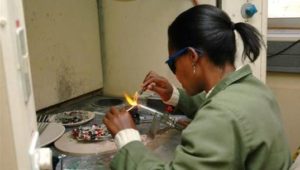South Africa’s mining industry to make use of non-traditional programs to empower youth
Even in 2016, the term “mining” brings to mind images of dust-covered coal miners with pickaxes. South Africa is rolling out a youth empowerment program in urban mining through its state-run mining and metallurgical entity, Mintek, that couldn’t be more different. Contrary to what its name suggests, urban mining does not involve any actual resource extraction. Urban mining is the slightly more glamorous and modern-day version of dumpster diving: this field re-appropriates pre-existing materials, such as recycled glass, into commercially viable semi-luxury goods.
At a recent South African conference, the Youth Mining Summit, government officials spoke about their desire to empower South Africa’s youth to look into the mining sector for jobs. The Youth Mining Summit occurred in mid-June, over the 40th anniversary of the infamous SOWETO Uprisings. To commemorate the historic youth uprising, South Africa dedicates each June to focus on youth development issues. This year, Deputy Director General of Mineral Regulation Joel Raphaela discussed the government’s efforts to encourage more young South Africans to go into the mining industry: “We continue to reach the youth through the department Learner Week Programs, where we create mining awareness by organizing mine visits around the country.” This sort of exposure, Raphaela hopes, will show young people from diverse backgrounds and educational qualifications that there are numerous job opportunities within the mining sector.
One Man’s Waste

Mintek Small Scale Mining & Beneficiation Program
An important component of this effort is the training and mentorship opportunities available to interested youth. Since 1934, Mintek has been South Africa’s leading mining and metallurgical research and development center. As South Africa begins to put a more visible emphasis upon black empowerment, Mintek is an integral part of a youth development program that looks to train young people in marketable metallurgy. Mintek emphasizes its newly branded urban mining program as the future for sustainable employment. A simple example of urban mining is the creation of glass beads from recycled bottles: Mintek provides training in all of the skills needed to turn glass bottles into beautiful jewelry with everything from different crushing techniques to the variety of ways to melt and re-purpose crushed glass. According to Mintek, “Urban mining presents numerous opportunities for young people to use urban waste to manufacture saleable products, without necessarily having a higher education qualification. The glass bead manufacturing process is a great example of this.”
Last year, Mintek provided 148 youth with practical training in partnership with the Mining Qualifications Authority (MQA), and the Department of Science and Technology. Thirty-six of these graduates have been placed in foundries across the country, where they continue to grow their theoretical and practical skill sets in the metallurgical field. Unemployed graduates from previously disadvantaged groups have the opportunity to receive further training in the field of occupational hygiene, surveying, mining, electrical and mechanical engineering. Not only is Mintek providing hands-on training, but it is working with local governments to set up training centers in the Northern Cape. Two such centers were established in Upington and Prieska, where students can get practical training for making jewelry from locally-mined semi-precious stones.
A Diamond in the Rough
South Africa’s mining stretches beyond metallurgy and re-appropriation of urban waste to the most glittering of all gems: diamonds. After the 2015 launch of the South African Young Diamond Beneficiators Guild, a collective of predominantly black-owned small and emerging diamond manufacturers, young adults were accepted into training programs to learn the cutting and polishing techniques employed to refine rough diamonds. 25 of the young trainees were accepted into a two-year training program based in Italy, but will also travel to Switzerland to learn about the technical art of watchmaking.
A watchmaking teaching curriculum is currently being developed in South Africa. Once it is completed and through the approval process, South Africa would be able to teach the special skill set for the first time in its history.
Digging Deep to Lift Up Youth
All of these initiatives have the same goal: to empower youth with marketable skills that will not only provide them with sustainable income, but will allow them to participate in the global economy. Training programs are blossoming in everything from urban mining to watchmaking, and it seems that this is only the beginning. As Raphaela said, the “economic empowerment of young people is not an option, but a national imperative.”



 As a group, they “already play a leading role in the development of the African continent. They contribute to consumer spending, shopping mall visits, They aspire to education, employment, entertainment and full access to electricity and the internet,” de Bigault
As a group, they “already play a leading role in the development of the African continent. They contribute to consumer spending, shopping mall visits, They aspire to education, employment, entertainment and full access to electricity and the internet,” de Bigault